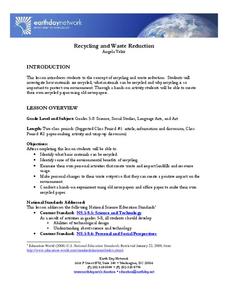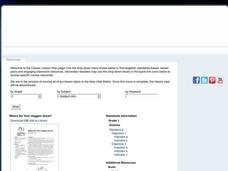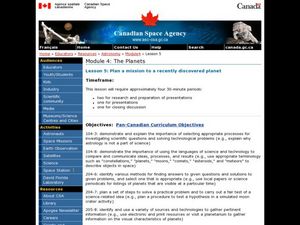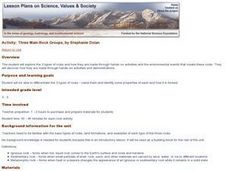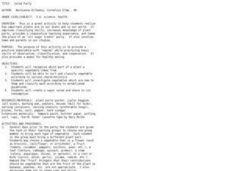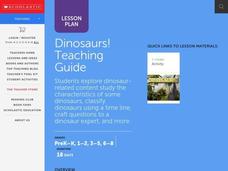Curated OER
Recycling and Waste Reduction
Students investigate recycling and waste reduction and its positive impact on the environment. In this environmental science lesson, students determine how and why materials are recycled. They apply their knowledge by making their own...
Curated OER
Microscope Investigation
Students explore physical science by participating in a science examination. In this microscope tutorial lesson, students read the book The Naked Eye and discuss the purpose for using a microscope in the field of science. Students...
Curated OER
Where Do Your Veggies Grow?
First graders investigate the origins of vegetables. In this Science lesson, 1st graders identify where fruits and vegetables come from. Students describe how people utilize plants.
Curated OER
Plan a Mission to Recently Discovered Planet
Young scholars plan a mission to a recently discovered planet. In this science lesson plan, students research spacecraft design, distances in space, long-term missions in space, and life-sustaining planets. Young scholars work in groups...
Curated OER
Three Main Rock Groups
Students are introduced to igneous, sedimentary and metamorphic rocks. They use foods to demonstrate the basic formation of each type of rock, read books about rock formation and view related videos.
Curated OER
Habitat Mural
Students build a collage of an ecosystem. The goal is for them to understand interactions in a community, plant and animal adaptations, and how all life depends on plants. This activity is based on Wump World and students describe what...
Curated OER
Introduction to Minerals
Young scholars discuss rocks and other earth materials made up of minerals. They identify minerals by means of their more obvious physical properties such as hardness, luster, color, streak, cleavage and fracture. They arrange a given...
Curated OER
Astrology: Fact or Fiction?
Students explore the topic of astrology and review the beliefs behind it. They read sample horoscopes. Using a portable digital planetarium, they view the night sky and the zodiac constellations. They examine and discuss the science...
Curated OER
Our Solar System
Students analyze the theories of the formation of the universe and solar system. Students analyze planetary motion and the physical laws that explain that motion: Rotation, Revolution, Apparent diurnal motions of the stars, sun, and...
Curated OER
The Water Cycle
Students list the nine places on earth where water is found. They define the terms cycle and water cycle. Students explain how energy from the sun powers the movement of water molecules through the water cycle. They name and describe...
Curated OER
Natural Features as a Resource
Students investigate how land and water can meet basic needs. In this natural resources lesson, students locate water features on a Landscape Picture Map and describe how water is used to meet their needs.
Curated OER
Exploring the USA and the World with Cartograms
Middle schoolers investigate cartograms in order to explore the different countries on Earth. In this world geography activity, students use the Internet to analyze data on different cartograms. Middle schoolers compare data, such as...
Curated OER
Planetary Orbits
Students explore space science by completing a solar system identification worksheet. In this planets lesson, students discuss the different planets in our star system and identify their traits. Students complete an orbital system...
Curated OER
Vegetable Party
Students classify vegetables and eat them as a salad. In this multi-disciplinary science and health lesson, students bring various vegetables to school and classify them in several different ways. Then with parent helpers, the students...
Curated OER
Sound and Hearing
Students form an understanding that there are many different types of sound. The core concepts are presented in the most basic form for elementary school. Also students investigate how sound travels.
Curated OER
Changing Circuits
Students observe an on-line activity to review the basics of electrical circuitry, then research answers to related questions on-line.In this lesson on changing components in a series circuit, students discover how different components...
Curated OER
Dinosaurs
Students will develop goals for inquiry. They will also improve content area reading and research skills. The context of studying dinosaurs will help learners to distinguish from organisms that live presently and those from the past...
Curated OER
Natural Disaster Risk at Home
Students analyze the natural disater threat and potential mitigation techniques of their (parents?) home. They apply classroom knowledge to students, non-academic daily life. Students recongize how earth processes specifically affect...
Curated OER
Challenger's Lost Lessons - The Lost Simple Machines Lesson
Students investigate the characteristics of simple machines. In this simple machine lesson, students investigate work as a product of applying constant force. They answer questions about what happens on Earth and what may have happened...
Curated OER
Creeping Sheets of Ice
Students conduct scientific investigation in which they observe glacial
effects on landscape, develop and explain their own theories of how glaciers change land, and demonstrate understanding and explain basic motion and force principles.
Curated OER
Greenhouse Effect: A Computer Simulation
Young scholars complete an online simulation of the greenhouse effect. In this instructional activity on the greenhouse effect, students use a website, similar to a webquest, to simulate and answer questions on how the greenhouse effect...
Curated OER
pH and Red Cabbage Juice
Students review properties of materials and define what pH tells them about matter. In this pH levels lesson, students determine whether materials are acids or bases using indicator substances.
Curated OER
Central Park Field Trip
Students visit the park to observe signs of spring in the forest and pond environments. For this field trip lesson, students explore the park for various items
Curated OER
Marine Animals on the Move
Students work with partners to track tagged animals using real-time data from satellites. Students gather and analyze data, compile information and conclusions and then prepare a final presentation of their research.


